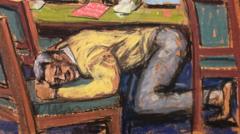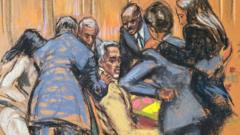Two prominent experts in the French antiques scene, Bill Pallot and Bruno Desnoues, have been found guilty of orchestrating a substantial forgery scheme involving historic chairs that they falsely claimed had royal ties to figures such as Marie Antoinette. The duo received prison sentences of four months, alongside suspended sentences, for their role in selling numerous counterfeit 18th-century chairs to notable collectors, including the Palace of Versailles and a member of the Qatari royal family.
Due to their time spent in pre-trial detention, they will not face further incarceration. However, they were also subject to significant financial penalties, with fines of €200,000 (£169,500) for Pallot and €100,000 for Desnoues. In response to his guilty verdict, Pallot expressed that the financial consequences felt excessive, yet he was relieved that his property in Paris would not be confiscated.
The trial highlighted Laurent Kraemer and his gallery in Paris, who were accused of negligence in verifying the authenticity of the pieces sold, including two chairs that fetched €2 million during a transaction with Qatari prince Mohammed bin Hamad Al Thani. However, on Wednesday, Kraemer’s team was acquitted of all deception charges, asserting their lack of knowledge regarding the fakes. His attorneys expressed relief upon the ruling, maintaining that the gallery fell victim to the counterfeiters and had consistently claimed their innocence.
At the time of his downfall, Pallot was highly regarded as an authority on French 18th-century chairs, having authored a notable text on the subject and serving as a lecturer at the Sorbonne University, where he had access to Versailles' historical archives. Pallot diligently identified chairs missing from the official catalogs and collaborated with Desnoues, a celebrated sculptor and craftsman involved at Versailles, to create convincing replicas. He claimed in court, "I was the head, and Desnoues was the hands," revealing the ease with which they carried out their deceit; stating, "Everything was fake but the money."
The prosecutor, Pascal Rayer, emphasized how the case has shed light on the secretive nature of the antique furniture market, highlighting inherent conflicts of interest when experts double as merchants. The impact of this case reverberates through the industry, promoting calls for stricter regulations within the art market to ensure transparency and fairness in future transactions.
The antique world has seen other scandals in recent years, including the notorious case of Jean Lupu, who was alleged to have sold counterfeit royal furniture globally until his passing in 2023 just before his court appearance. The industry's cleanliness now appears in question, as the Pallot and Desnoues case catalyzes discussions for needed reforms.





















